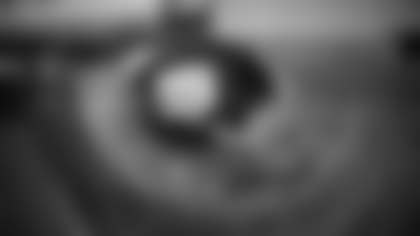EAST RUTHERFORD, NJ
Q: You said in your news conference that players speaking up at halftime like Osi Umenyiora and Justin Tuck did the other day is not that unusual. Do you like to see the players take ownership of their performance like that?
Coughlin: "It's a good thing. That's what you talk about all the time. When done properly and handled properly - and those two players handled it very well - they expressed themselves. There was emotion, there was authority, there was a mode of responsibility involved, and there was a statement from one player to another that we can do things a lot better than what we were doing them up to that point."
Q: You didn't play well in the first half. If they hadn't spoken up, were you going to...
Coughlin: "You know what, everybody says we didn't. The defense didn't play well in the first half. The offense and special teams played okay, but the defense didn't play well in the first half. I didn't see a whole lot of - we made big plays in the second half offensively and special teams remained consistent in terms of keeping the outstanding returners in check. But our defense rose to the occasion, giving up only three points (in the second half), which was the intent in the very beginning. The thing which was mind-boggling is there's really only one theme all week long repeated over and over again: stop the run. But we didn't do that."
Q: There is so little time at halftime now (12 minutes)…
Coughlin: "That is the bad part. I get right at about the two-minute mark, I get worried that there are two minutes to go. So there's not a lot of time. Players barely get to the training room to take care of their personal needs, get back in their chair for the coordinators, and there are a couple of minutes, that's it."
Q: During a halftime, what do you normally have time to do?
Coughlin: "Bounce back and forth with the staffs - offense, defense, special teams. Talk about whatever is apparent and has to be directed. Sometimes I'm just listening. Sometimes I invoke. But most of the time it's a very - people have to get their information shared. It's not an interruption time. It's a time for people to gather information and make decisions on the second half. Sometimes it requires a thought or two, but not very often. You're moving."
Q: The Giants have allowed an NFL-low 12 sacks, and none in the last four games. It's certainly a tribute to the players doing the blocking, but how much of it has to do with Eli Manning having a better sense of when to get rid of the ball than he did earlier in his career?
Coughlin: "It's a team effort, no question. The offensive line has done a good job. The communication has been outstanding. The backs, the tight ends have all contributed. The receivers, in terms of the adjustments to the quick game or the hot-sight adjustments, the ball coming out of the quarterback's hand fast, Eli making the proper decisions in terms of directing the protection - so all those things prevail."
Q: You always talk about the importance of eliminating turnovers and penalties, but where do you rank keeping the quarterback upright and not giving up sacks?
Coughlin: "Well, the quarterback is the number one individual in pursuit of trying to get the ball turned over whether it's pressure, whether it's hits on the quarterback, the ball coming out, interceptions, whatever it might be. If you can keep the quarterback standing upright, then obviously he's in a position to take better care of the ball."
Q: Was one of the best things that came out of that game last week was the fact that you had no turnovers?
Coughlin: "No question. It was significant in that we, as I told the players, the fact that we did not give the ball away allows for our players to play the game and it allows us to utilize our talent as it should be utilized rather than giving people opportunities that they shouldn't have - be it short range, whatever it might be, just momentum changing plays. So we didn't have any of those last week, and it was a big plus."
Q: You almost had one, but you won the challenge on the first series
Coughlin: "That's right. That, on the other hand, should have gone in the damn end zone (the Giants settled for a field goal)."
Q: Along those lines, you haven't had a first half touchdown in three games. The first possessions have given you just three points all season. Is that a source of frustration to you? Is it tough because you're often coming from behind because you're not getting those early scores?
Coughlin: "It didn't make any difference about three weeks ago because we were still scoring a lot of points. We haven't scored a lot of points lately. Now it's becoming a factor, but it wasn't a factor we dealt with prior to that."
Q: Can you do something differently at the start of games?
Coughlin: "Well, we did score for the first time last week on a first possession. It wasn't a touchdown, but we did score."
Q: Eli mentioned the other day that you didn't use as many three wide receiver formations last week because of the injuries you had at that position. You used two tight ends more often. Did you feel at all limited in what you could do last week because of the players you were missing?
Coughlin: "That's not the way it works. You deal with the guys you have. You put together the plan according to what you need to do in order to win. There were plenty of three-wide sets on third down. We didn't use them on first and second down as much, but we tried to direct ourselves in such a way - that's why I said it - run the ball, stop the run. And then to not stop the run, here we are, limited in some ways. So, no. If anything, you have to be absolutely sure of how you're going to use your people when they're new. And the guys that have just joined us, you have got to be absolutely sure what you want them to be prepared to do."
Q: Your top two special teams tacklers are Dave Tollefson and Jason Pierre-Paul, who are both defensive ends. Is it unusual to see defensive linemen featured so prominently on special teams? Aren't those positions most often filled by linebackers and defensive backs?
Coughlin: "If you really study special teams, you'll note that there is - in the really good special teams outfits - always a big man or two who draws attention, draws the double teams, spearheads the group that hits the wedge, attacks the lead blockers, that type of thing. We used Justin Tuck his rookie year in that role. We're using JPP in that role. Dave plays X-amount of plays per game as a rotational defensive lineman and he plays on special teams."
Q: Am I correct in saying that Tollefson brings a certain level of enthusiasm to the special teams play?
Coughlin: "I think he does, yes. Energy."
Q: You have five games left, all in the conference, including three in the division. Do you spend more time toward the end of the season laying out the big picture for the players, making sure they're aware of what's at stake?
Coughlin: "You do. You want to make sure that they understand that, really, come Sunday - there are, what, 29 days left in the season, less than that - so you want to make sure that everyone understands the degree of focus and concentration that goes with this time of year. People work themselves into position or out of position, and it all happens from Thanksgiving right through the first of the year. So, yes, you make them aware of it, make them understand the importance of each game. For example this week playing Washington, it's in the division. And Washington is 2-1 in the division and we're sitting here 1-2. We need to win some games in the division."
Q: They've had injuries at running back, but do you consider any team with Donovan McNabb, Santana Moss and Chris Cooley to be a dangerous team?
Coughlin: "And (Anthony) Armstrong – they sure they are. They have big play potential. They run the ball. They execute the big play. They have an outstanding array of gadget plays. Obviously they have a veteran quarterback to lead them. (Fred) Davis is good, the two tight ends are both extremely effective."
Q: Defensively, London Fletcher has always been a tackling machine, and Brian Orakpo seems to have taken to that outside linebacker role in the 3-4, hasn't he?
Coughlin: "With (Lorenzo) Alexander and Orakpo, they've got two big strong guys coming off the edge, similar to what you see in the Dallas 3-4, and the utilization of those type of players everywhere - special teams, third down."
Q: (Return specialist) Brandon Banks might be generously listed at 5-foot-7, but he's a threat to go all the way whenever he gets the ball.
Coughlin: "Any time he touches it. He's one of those guys that can ruin the game. He's got outstanding numbers in both kickoff and punt return, and they count on him for field position."





